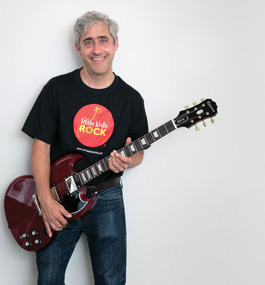Keeping the Fun in Music Fundamentals

Dan Epstein
David Wish ’90, P’21
As a child, David Wish ’90, P’21, asked a music teacher if he could learn to play “Eleanor Rigby” on the violin. The idea was quickly shot down.
The same thing happened when he boasted he wanted to play drums like Led Zeppelin’s John Bonham. “My teacher said, ‘That’s not good music — you’re going to learn to play jazz,’” Wish recalls. “So I decided I wasn’t musical, because I didn’t fit in.”
Then, at Brandeis, a friend showed him how to play a few bars of a Creedence Clearwater Revival song on the guitar. “My life changed at that moment,” says Wish, who now plays guitar, piano and five other instruments. “Brandeis is where my musicality really blossomed, and I never took a music class. Not one. I just played music with all my friends.”
After college, Wish taught first grade at a public school in East Palo Alto, California, a city with a large low-income population. Frustrated with the lack of funding for music education, he began an after-school guitar class. Instead of focusing on classical and jazz standards, he encouraged students to play their favorite rock ’n’ roll, pop and hip-hop songs. The children quickly mastered dozens of tunes, and started writing and recording their own compositions. As more and more students signed up, Wish recruited other teachers to help.
“Shy kids started speaking up,” he says. “Tough kids started softening up. The whole culture of the school began to change. It was like a revolution.”
Motivated by what he was witnessing, Wish in 2002 founded the nonprofit Little Kids Rock, which has transformed music education for more than 850,000 students nationwide. Based in Verona, New Jersey, the organization developed a program called Modern Band, which provides free instruments and instruction to more than 400 public-school districts, most of them serving underprivileged areas. Teachers, who apply to be trained in the group’s curriculum, are given the resources they need to launch Modern Band at their school, either during regular school hours or as an after-school enrichment program.
The program follows a radically different methodology. Children start by practicing chord shapes and imitating songs they know and love rather than learning how to read music first. Then they’re urged to improvise. “Music is being drawn out of them instead of drummed into them,” says Wish.
Funded through grants, charity events and fundraising initiatives, Little Kids Rock has many celebrity supporters. Bonnie Raitt, Carlos Santana and Ziggy Marley are honorary board members. Lady Gaga, Josh Groban and Usher have attended benefit concerts and donated musical instruments. Pop star Charlie Puth, Slash of Guns N’ Roses and Adam Lambert have visited schools to jam with Little Kids Rock students.
Wish says Brandeis’ emphasis on social justice had a powerful impact on his life. As an undergrad majoring in sociology and history, he slept in a mock shantytown to protest apartheid in South Africa. Today, he fights inequality by giving economically disadvantaged children the power to express themselves through music. And the Wish family’s ties to the university extend through the generations. Wish’s father, Carl ’60, P’90, G’21, attended. His daughter, Maya ’21, is a rising senior.
Looking ahead, Wish hopes Little Kids Rock can expand its reach. The need is there: According to the Grammy Music Education Coalition, 3.8 million U.S. students remain without access to music education. And Wish aims to revamp the way music teachers are educated, too. Little Kids Rock is partnering with 60 U.S. colleges and universities to train music-education majors in the Modern Band method.
“Our goal,” he says, “is to completely change the ecosystem in which music education happens.”
— Heather Salerno
